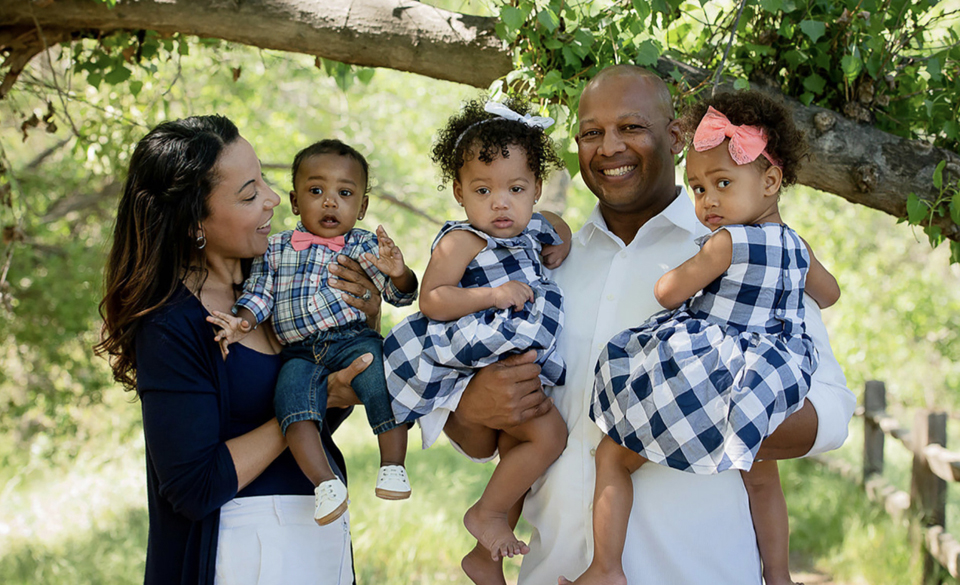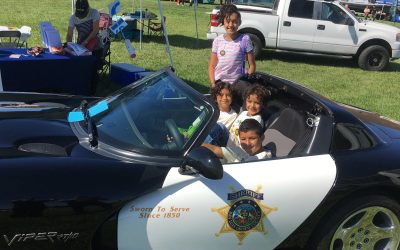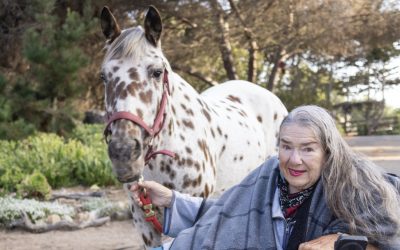Markel Quarles, a 1993 graduate of San Luis Obispo High School and a 1998 graduate of Cal Poly, is in the business of helping young people to reach their dreams. As the African proverb he shared with me implies, sometimes a person has to first overcome their own perceived inadequacies and circumstances in order to face the challenges of the larger world successfully. Markel believes his experience qualifies him to be the kind of mentor every young person needs.
Born at Sierra Vista Hospital, “in Room 204,” Markel said, he grew up with his mother, Betty Purify, and his stepfather, Gerald Purify. He attended Bishop Peak Elementary, Laguna Middle School, starred in football at SLOHS, where he was Homecoming King his senior year, received an athletic scholarship to play football at Cal Poly, where he also earned Bachelors and Masters degrees, in physical education, and education and counseling. He went on to earn his Doctor of Education degree in Educational Leadership at UC Santa Barbara.
“Most of my experience growing up in San Luis Obispo was positive. My world consisted of church, school and sports. We were members of the House of Prayer Church. My parents were very involved, and for the last eleven years they have pastored Breakthrough Ministries.” Betty and Gerald are also known for their musical ability. Gerald’s uncle is Bobby Purify, a rhythm and blues legend.
Born at Sierra Vista Hospital, “in Room 204,” Markel said, he grew up with his mother, Betty Purify, and his stepfather, Gerald Purify. He attended Bishop Peak Elementary, Laguna Middle School, starred in football at SLOHS, where he was Homecoming King his senior year, received an athletic scholarship to play football at Cal Poly, where he also earned Bachelors and Masters degrees, in physical education, and education and counseling. He went on to earn his Doctor of Education degree in Educational Leadership at UC Santa Barbara.
“Most of my experience growing up in San Luis Obispo was positive. My world consisted of church, school and sports. We were members of the House of Prayer Church. My parents were very involved, and for the last eleven years they have pastored Breakthrough Ministries.” Betty and Gerald are also known for their musical ability. Gerald’s uncle is Bobby Purify, a rhythm and blues legend.
Markel identified former SLOHS football coach, Vic Ecklund, as one of his mentors, and also Doug Morrow, Laguna Middle School physical education teacher, both of whom coached at Cal Poly when Gerald was a member of the 1980 Division II National Championship team. “From them I learned humility, always striving to be better, never resting on your laurels, and being a student of your craft, learning to play the right way.”
After scoring five touchdowns against Atascadero during his senior year, when he felt “unstoppable,” he was taught a lesson in humility at the following day’s film session. “If we hadn’t won the game, you would have thought I had my worst game ever. I got ripped pretty bad for the things I didn’t do well,” Markel said with a smile. “I learned that regardless of having success, there’s still work to do.”
But growing up in San Luis Obispo was not always easy for Markel. “I felt like I lived in two different worlds. I was celebrated for my accomplishments, but the other side was that I was the only person who looked like me in every class I was ever in,” Markel said, referring to being African American. “I had my formal school education, but I was also taught important things at home, and one of them was how to survive as an African American in San Luis Obispo and in the world at large. Those were hard lessons to learn, but I very much appreciate them because I’ve had to pass them on to my children as well.”
After scoring five touchdowns against Atascadero during his senior year, when he felt “unstoppable,” he was taught a lesson in humility at the following day’s film session. “If we hadn’t won the game, you would have thought I had my worst game ever. I got ripped pretty bad for the things I didn’t do well,” Markel said with a smile. “I learned that regardless of having success, there’s still work to do.”
But growing up in San Luis Obispo was not always easy for Markel. “I felt like I lived in two different worlds. I was celebrated for my accomplishments, but the other side was that I was the only person who looked like me in every class I was ever in,” Markel said, referring to being African American. “I had my formal school education, but I was also taught important things at home, and one of them was how to survive as an African American in San Luis Obispo and in the world at large. Those were hard lessons to learn, but I very much appreciate them because I’ve had to pass them on to my children as well.”
Markel shared stories about visiting the homes of classmates for playdates, but none of his classmates coming to his home; about being told he was going to hell because of his color; about being the only student in a math class asked to show the teacher his schedule on the first day of school; about always getting his groceries bagged to avoid being accused of theft; about always carrying his ID; about how to deal with the police when pulled over.
“It’s hard not to get emotional,” Markel said, as he told me about a particularly terrifying incident. “I was driving a friend home after working a late shift at Taco Bell. We were pulled over by the police, guns drawn. One of the officers recognized me. ‘Aren’t you Markel Quarles? Didn’t you score three touchdowns last night?’ he said while pointing his gun at me. They told me I fit the description of someone they were looking for.”
His experiences taught Markel to always strive to be the best at what he did, to “give people something positive to talk about as a representative of people who looked like me.” And despite the dissonance of “living in two worlds,” Markel said without hesitation or qualification, “San Luis Obispo gave me so much and I’m so grateful to have grown up here. It’s home; it shaped who I am. I feel a responsibility to pay it forward.”
Life’s challenges increased for Markel when he became a father at nineteen, married at twenty and had another child. He was going to school, working, playing football, caring for his family and his grades were suffering. He entered what he called a dark period and it took a conversation with his grandmother and the threat of losing his scholarship to get him back on track. He and his wife divorced and eventually he had sole custody of his children, Ebony and Elliott. “The Cal Poly Children’s Center saved me. I learned so much about being a parent from them.”
“It’s hard not to get emotional,” Markel said, as he told me about a particularly terrifying incident. “I was driving a friend home after working a late shift at Taco Bell. We were pulled over by the police, guns drawn. One of the officers recognized me. ‘Aren’t you Markel Quarles? Didn’t you score three touchdowns last night?’ he said while pointing his gun at me. They told me I fit the description of someone they were looking for.”
His experiences taught Markel to always strive to be the best at what he did, to “give people something positive to talk about as a representative of people who looked like me.” And despite the dissonance of “living in two worlds,” Markel said without hesitation or qualification, “San Luis Obispo gave me so much and I’m so grateful to have grown up here. It’s home; it shaped who I am. I feel a responsibility to pay it forward.”
Life’s challenges increased for Markel when he became a father at nineteen, married at twenty and had another child. He was going to school, working, playing football, caring for his family and his grades were suffering. He entered what he called a dark period and it took a conversation with his grandmother and the threat of losing his scholarship to get him back on track. He and his wife divorced and eventually he had sole custody of his children, Ebony and Elliott. “The Cal Poly Children’s Center saved me. I learned so much about being a parent from them.”
While studying for his Masters, Markel worked with athletes for Cal Poly’s student academic services department and also for the Educational Opportunity Program (EOP), which provides support for students with socio-economic disadvantages, many of them students of color. He felt a sense of obligation to help those students navigate life at Cal Poly.
In 2001, Markel married Theressa Gupton, also a SLOHS grad. Together they have five children and three grandchildren. His only regret is that as of now none of his grandchildren live in California. “It’s different because we don’t get to see them as frequently as we would like. Face Time and holidays are our usual contact with them.”
Markel started working in career services and community engagement at Cal Poly, “a space that I’m still in now,” and in 2006 began commuting to UCSB where he earned his ED. D., hoping to advance his administrative career. He followed advice to go somewhere where there was a great need for student assistance, taking a job at Arkansas State University in 2012, where he was director of career services, working with students from impoverished backgrounds. He also learned that Jim Crow was alive and well when a colleague warned him to be less vocal in meetings, saying “This isn’t California.” “It gave me more incentive to give voice to the silenced, to support their dreams,” Markel said.
In 2001, Markel married Theressa Gupton, also a SLOHS grad. Together they have five children and three grandchildren. His only regret is that as of now none of his grandchildren live in California. “It’s different because we don’t get to see them as frequently as we would like. Face Time and holidays are our usual contact with them.”
Markel started working in career services and community engagement at Cal Poly, “a space that I’m still in now,” and in 2006 began commuting to UCSB where he earned his ED. D., hoping to advance his administrative career. He followed advice to go somewhere where there was a great need for student assistance, taking a job at Arkansas State University in 2012, where he was director of career services, working with students from impoverished backgrounds. He also learned that Jim Crow was alive and well when a colleague warned him to be less vocal in meetings, saying “This isn’t California.” “It gave me more incentive to give voice to the silenced, to support their dreams,” Markel said.
His experience at ASU opened the door to an opportunity at CSU Bakersfield, where he has worked since 2016, following his belief in “going where work needs to be done, where there are pressing issues.” He provides “leadership and oversight over career development, employer recruitment, internships, service-learning, and community engagement.”
In 2017 Markel was honored as an American Council on Education Fellow. He is also an Executive Leadership Academy Fellow. He has been a speaker and a facilitator for education conferences and workshops statewide and nationally.
If his career goes as planned, Markel will transition into a senior leadership position when the time is right. His great hope is that “every young person sees college as the next step to unleash their potential and actualize it, to take ownership of their lives, regardless of the challenges confronting them, to accomplish their dreams. Everyone needs mentors. Having received, it is my job to give back.”
I am proud to write that Markel was a student in my English class at SLOHS. I gained great respect for him at that time. First and foremost, he was, and is, a gentleman. And just as he perceived himself after that big game against Atascadero in 1992, I left my wonderful conversation with Markel with one overriding perception: unstoppable.
In 2017 Markel was honored as an American Council on Education Fellow. He is also an Executive Leadership Academy Fellow. He has been a speaker and a facilitator for education conferences and workshops statewide and nationally.
If his career goes as planned, Markel will transition into a senior leadership position when the time is right. His great hope is that “every young person sees college as the next step to unleash their potential and actualize it, to take ownership of their lives, regardless of the challenges confronting them, to accomplish their dreams. Everyone needs mentors. Having received, it is my job to give back.”
I am proud to write that Markel was a student in my English class at SLOHS. I gained great respect for him at that time. First and foremost, he was, and is, a gentleman. And just as he perceived himself after that big game against Atascadero in 1992, I left my wonderful conversation with Markel with one overriding perception: unstoppable.





